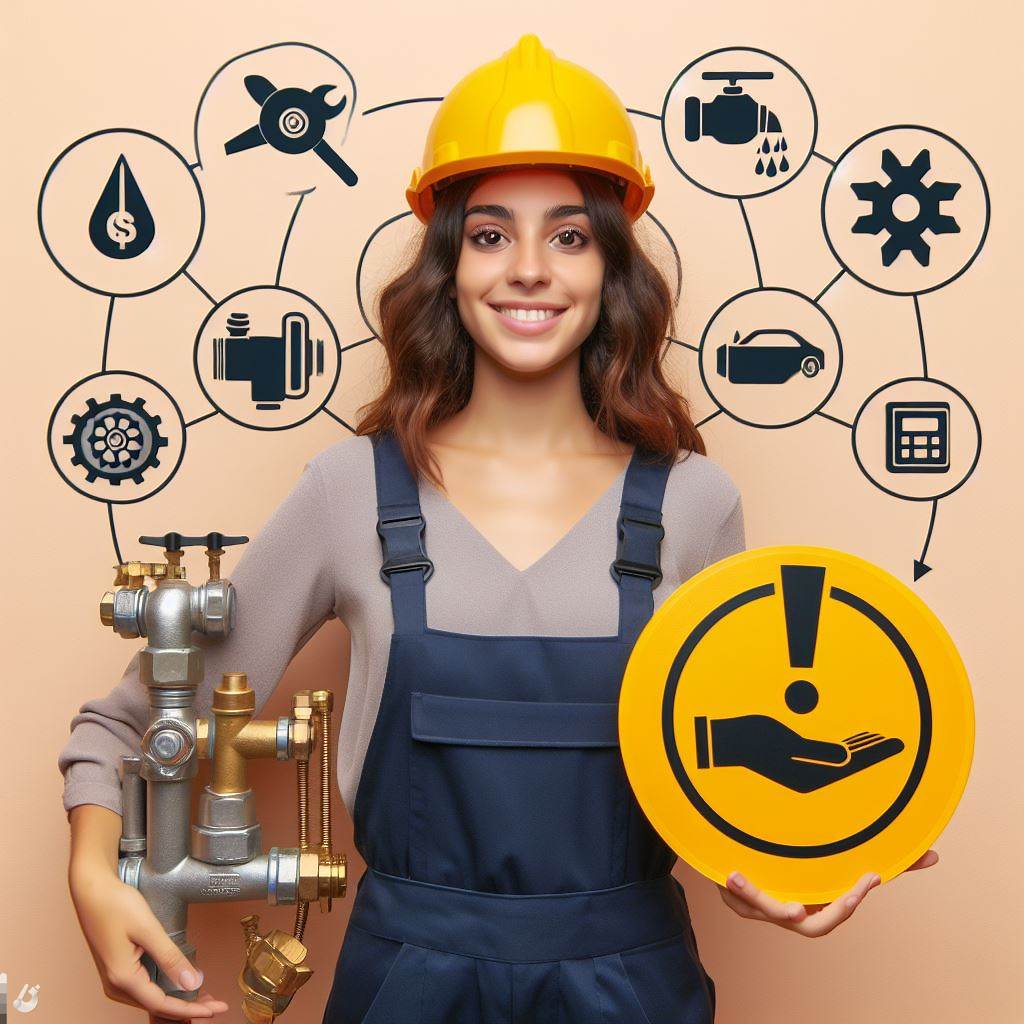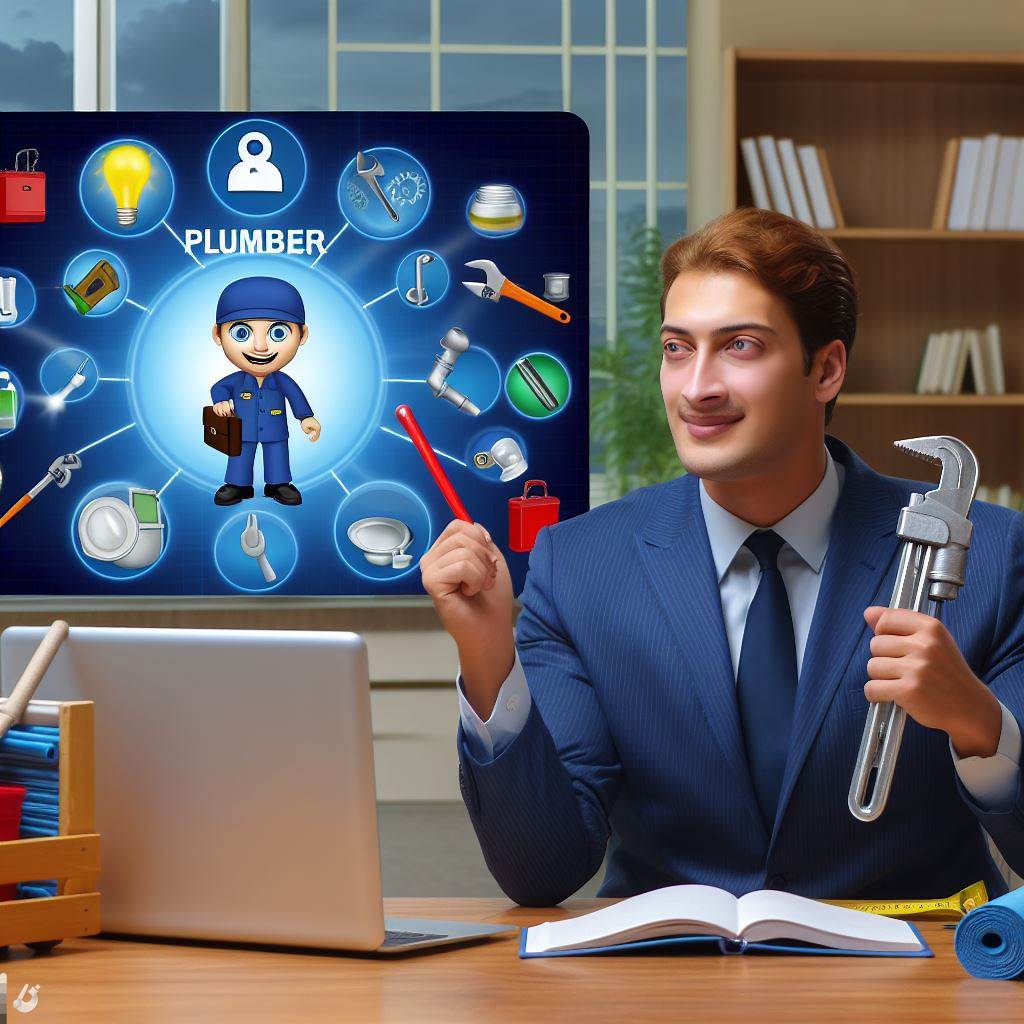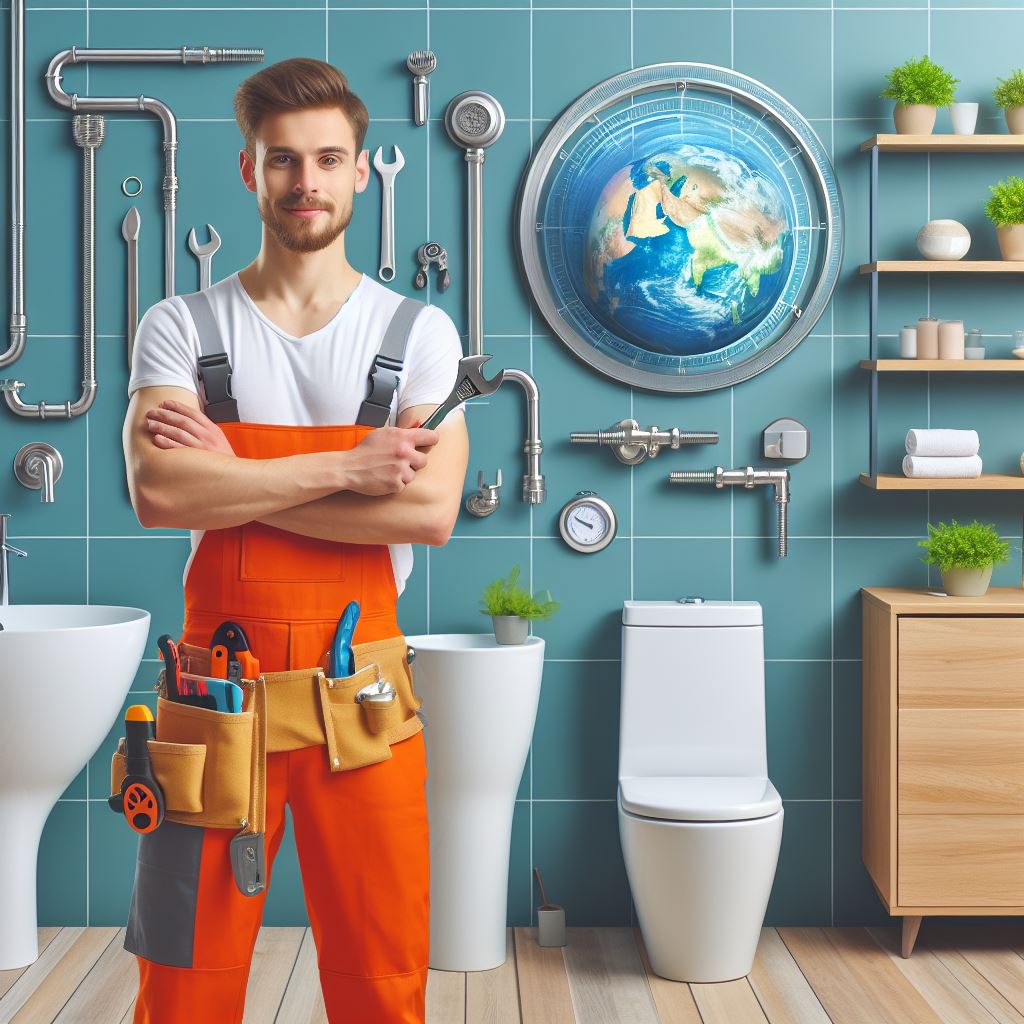Introduction
Brief explanation of plumbing regulations in the UK
Plumbing regulations in the UK are essential guidelines that ensure the safety and functionality of plumbing systems.
Understanding and complying with these regulations is crucial for plumbers and homeowners alike.
In the UK, plumbing regulations serve to protect public health and maintain high standards of water supply and sanitation.
Compliance with these regulations is mandatory for all plumbing work, including installations, repairs, and maintenance.
These regulations cover various aspects, such as the materials used in plumbing systems, wastewater disposal, water efficiency, and backflow prevention.
They aim to prevent contamination, leaks, and other potential hazards that may arise from substandard plumbing practices.
Importance of understanding and complying with these regulations
Complying with plumbing regulations is not only a legal requirement but also a responsible approach that ensures the safety and well-being of occupants.
Failure to adhere to these regulations can lead to serious consequences, including fines, legal issues, and even prosecution.
Understanding plumbing regulations also allows homeowners to assess the quality of plumbing work and make informed decisions when hiring plumbers.
It enables them to ensure that the work is being carried out to the required standards and that their plumbing systems are installed or repaired correctly.
Additionally, adherence to these regulations ensures that plumbing installations are durable, efficient, and environmentally friendly.
By following proper guidelines, plumbers contribute to conserving water, reducing wastage, and minimizing the negative impact on the environment.
Therefore, plumbing regulations in the UK are vital for maintaining the safety, functionality, and integrity of plumbing systems.
Understanding and complying with these regulations is not just a legal obligation, but a responsible commitment towards public health and environmental sustainability.
Overview of plumbing regulations in the UK
Plumbing regulations in the UK are overseen by the Water Safe, a governing body responsible for regulating plumbing activities.
Personalized UK Career Consulting
Receive tailored career guidance designed just for you. Get actionable steps and expert support to boost your career in 1-3 days. Take control of your career now.
Get StartedPlumbers in the UK must adhere to various key legislations and codes of practice to ensure safety and compliance.
Legislation and codes of practice that plumbers must adhere to
One vital legislation, the Water Supply (Water Fittings) Regulations 1999, applies to all plumbing systems and building materials.
Competent individuals must execute plumbing work, ensuring proper installation and maintenance of water systems.
The Water Supply (Water Fittings) Regulations encompass preventing contamination, water efficiency, and temperature control.
Another crucial legislation is Building Regulations Approved Document G, which outlines standards for plumbing in new buildings and renovations.
It covers drainage, sanitary fittings, hot water systems, and water efficiency measures.
Plumbers must adhere to this document to meet required standards, ensuring safety and water efficiency.
In addition to legislations, plumbers must follow codes like the Water Regulations Advisory Scheme (WRAS).
WRAS provides guidance for the installation, maintenance, and use of water fittings and plumbing systems.
Registered plumbers with WRAS demonstrate commitment to quality and compliance with industry standards.
Other codes include British Standards for plumbing materials, ensuring quality and safety requirements.
Plumbers should also follow guidance from the Chartered Institute of Plumbing and Heating Engineering (CIPHE).
CIPHE offers resources and support, promoting professionalism and competence in the industry.
In summary, Water Safe oversees UK plumbing regulations, including key legislations and codes like WRAS and British Standards.
Your Dream Job Starts with a Perfect CV
Get a tailored CV and cover letter that captures your unique strengths and stands out in your industry. Let us help you make an unforgettable first impression.
Get StartedBy following these, plumbers ensure safety, efficiency, and quality in their plumbing installations.
Read: UK Joinery Apprenticeships: A Complete Guide
Qualifications and Certifications Required
When it comes to becoming a licensed plumber in the UK, certain qualifications and certifications are mandatory.
Let’s dive into the necessary requirements and the role of apprenticeships and vocational training in acquiring these qualifications.
Necessary Qualifications and Certifications
- Level 2 or 3 Diploma in Plumbing and Domestic Heating.
- Certificate in Basic Plumbing Studies.
- NVQ Level 2 in Plumbing and Heating.
- Water Regulations Advisory Scheme (WRAS) Certification.
- Certificate of Competence in Gas Safety for Domestic Installers (CCN1).
- Energy Efficiency for Domestic Heating (Part L).
- Building Regulations for Plumbing and Heating Installations (Part G).
- Health and Safety Certification (such as Construction Skills Certification Scheme card).
These qualifications encompass a wide range of knowledge and skills necessary to work as a competent plumber in the UK.
The Role of Apprenticeships and Vocational Training
Apprenticeships play a vital role in equipping individuals with the required skills and knowledge to become licensed plumbers.
Here’s how apprenticeships and vocational training contribute:
Practical Experience
Apprenticeships allow aspiring plumbers to gain practical experience by working alongside experienced professionals in real-life plumbing scenarios.
This hands-on training helps them apply theory to practice and develop essential skills.
Knowledge and Expertise
Vocational training programs provide a solid foundation in plumbing theories, concepts, and industry best practices.
These courses cover areas such as pipe installations, heating systems, drainage systems, and water regulations.
Mentorship and Guidance
During apprenticeships, trainees benefit from mentorship and guidance from experienced plumbers.
This guidance helps them navigate challenges, learn from their mentors’ experience, and develop advanced skills.
Regulatory Compliance
Apprenticeships also focus on teaching aspiring plumbers about plumbing regulations and standards imposed by regulatory bodies.
Optimize Your LinkedIn for Success
Boost your LinkedIn profile with a professional bio, keyword-rich headline, and strategic recommendations that attract recruiters. Stand out from the crowd and get noticed.
Optimize NowThis knowledge is crucial for ensuring compliance and delivering safe and efficient plumbing services.
Industry Connections
Vocational training and apprenticeships often provide opportunities for trainees to establish vital connections within the plumbing industry.
These connections can lead to future job prospects, collaborations, or even starting their own plumbing businesses.
Becoming a licensed plumber in the UK requires individuals to fulfill specific qualifications and certifications.
Apprenticeships and vocational training programs serve as crucial stepping stones towards acquiring these credentials.
They offer practical experience, industry knowledge, mentorship, regulatory compliance, and valuable connections within the plumbing industry.
By completing the necessary training and obtaining the required qualifications, aspiring plumbers can establish themselves as competent and skilled professionals in the field.
Read: Joinery Business Tips for UK Entrepreneurs
Health and safety regulations
Health and safety regulations play a crucial role in ensuring the well-being of plumbers as well as the general public.
These regulations are specifically designed to minimize the risks associated with plumbing work and protect individuals from potential hazards.
By adhering to these regulations, plumbers can create a safe and secure environment for themselves and their clients.
Specific regulations related to personal protective equipment, working at heights, and handling hazardous substances
Here are some specific regulations related to personal protective equipment (PPE), working at heights, and handling hazardous substances that every plumber in the UK should be aware of to maintain a safe workplace:
Personal Protective Equipment (PPE)
Plumbers must wear appropriate PPE, including safety goggles, gloves, and protective clothing, to safeguard themselves from potential injuries.
PPE helps prevent cuts, burns, exposure to harmful substances, and other occupational hazards.
Working at Heights
When working at heights, plumbers must ensure their safety by using ladders, scaffolding, or safety harnesses.
They should inspect and maintain such equipment regularly to ensure it is in good working condition and can support their weight.
Handling Hazardous Substances
Plumbers often deal with hazardous substances like chemicals, solvents, and asbestos.
They must follow strict guidelines for their storage, transportation, and disposal to minimize the risk of exposure.
Proper labeling, storage in designated areas, and use of protective gear are crucial when handling such substances.
Noise and Vibration
Plumbers frequently use power tools and machinery which can produce high levels of noise and vibrations.
By using ear protection and anti-vibration gloves, they can prevent long-term hearing damage and reduce the risk of hand-arm vibrations syndrome.
Electrical Safety
Working with water and electricity poses significant risks.
Plumbers must adhere to electrical safety regulations, such as the use of residual current devices (RCDs) and proper grounding, to avoid electric shocks or fires.
Fire Safety
Plumbers should have a fire safety plan in place and be aware of fire exits and fire extinguisher locations.
Regular checks on electrical connections and using flame-resistant materials can minimize the risk of fire incidents.
Manual Handling
Lifting heavy objects can lead to musculoskeletal injuries.
Plumbers should use proper lifting techniques, such as bending their knees and keeping their backs straight, or use mechanical aids to avoid strain or injury.
First Aid
Plumbers should be trained in first aid procedures and have access to first aid kits on site.
Prompt response to accidents or injuries can mitigate the impact and potentially save lives.
Asbestos Awareness
Asbestos, commonly found in older buildings, poses severe health risks.
Plumbers should undergo asbestos awareness training to identify and handle asbestos-containing materials safely.
Risk Assessments
Plumbers must conduct thorough risk assessments before starting any plumbing work.
This involves identifying potential hazards, evaluating risks, and implementing control measures to avoid accidents or injuries.
By strictly following these health and safety regulations, plumbers can significantly reduce the likelihood of accidents, injuries, and long-term health issues.
Prioritizing the well-being of both themselves and their clients ensures a safe and successful plumbing work environment.
Read: DIY Joinery: UK Home Enthusiasts’ Guide

Technical Requirements and Standards in Plumbing
Plumbers in the UK are required to meet a range of technical requirements and standards in order to ensure safe and efficient plumbing systems in buildings.
Understanding these requirements and complying with them is of utmost importance for every professional plumber.
Let’s take a closer look at some key technical aspects that plumbers need to be familiar with:
Water Supply and Drainage Systems
- Plumbers must have a thorough understanding of water supply systems, including the proper installation and maintenance of pipes, fittings, and appliances.
- They need to ensure the correct sizing and pressure of pipes, as well as proper insulation to prevent heat loss or damage.
- Knowledge of drainage systems is equally crucial, as plumbers must be able to design and install effective wastewater removal systems.
- Proper slope and venting of drainage pipes, as well as the installation of traps and backflow prevention devices, are essential to prevent sewage backups and contamination.
Water Regulations
- Plumbers must comply with water regulations enforced by the UK government to ensure the safety of the water supply.
- These regulations cover various aspects, such as the use of approved materials, water efficiency, and the prevention of cross-contamination.
- Plumbers should be familiar with the guidelines provided by organizations like the Water Regulations Advisory Scheme (WRAS) and follow them diligently.
- By following water regulations, plumbers help to safeguard public health and protect the environment by preventing water wastage.
Building Codes
- Knowledge of building codes is essential for plumbers as they ensure that plumbing installations meet the required standards.
- Building codes specify the minimum requirements for plumbing design, construction, and maintenance in different types of buildings.
- Plumbers must pay attention to regulations related to pipe materials, fixture placements, ventilation, and access for maintenance purposes.
- Adhering to building codes not only ensures compliance but also provides peace of mind to property owners and occupants.
Importance of Compliance
- Compliance with technical requirements and standards is crucial to guarantee the safety and functionality of plumbing systems.
- Failure to comply can lead to plumbing failures, leaks, health hazards, and even legal consequences for both plumbers and property owners.
- By staying updated on technical requirements, plumbers can enhance their professionalism and reputation in the industry.
- Customers rely on qualified plumbers who follow regulations, ensuring that their plumbing systems are installed and maintained correctly.
Most importantly, understanding and meeting the technical requirements and standards in plumbing is vital for plumbers in the UK.
A thorough knowledge of water supply and drainage systems, water regulations, and building codes ensures the safety and efficiency of plumbing installations.
Compliance not only protects public health and the environment but also ensures customer satisfaction and the professionalism of plumbers.
Read: The Role of Joinery in UK’s Construction Sector
Documentation and record-keeping
Documentation and record-keeping are crucial in the plumbing industry in the UK. Accurate records ensure transparency and accountability, while proper documentation establishes trust and compliance with regulations.
Maintaining accurate records and documentation is of utmost importance in the plumbing industry. Not only does it provide a clear trail of work performed, but it also helps in resolving any disputes or issues that may arise.
The types of documentation required, such as invoices, certificates, and maintenance reports
Plumbers need various types of documentation to comply with regulations and uphold professionalism in the industry.
Invoices are vital for proving financial transactions, offering detailed breakdowns of services and charges.
Certificates play a crucial role in validating plumbers’ qualifications and competence, necessary for proving compliance with standards.
Maintenance reports are essential for documenting routine check-ups, repairs, and servicing, aiding in tracking system conditions and identifying potential issues.
General records, encompassing customer details, job specifications, and additional notes, facilitate referencing past work and providing a comprehensive system history.
Proper documentation not only ensures compliance but serves as a reliable reference for future projects.
Accessibility and organization are key, ensuring records are easily reachable and properly arranged.
Digital documentation, such as electronic invoices and certificates, simplifies the record-keeping process, while periodic auditing is crucial to ensure all documentation is up-to-date and in compliance.
This proactive approach helps address any issues before they become problems.
Accurate records contribute to industry professionalism, enhancing customer confidence and trust.
In short, maintaining precise records and documentation is imperative in the UK plumbing industry.
Diligence in handling invoices, certificates, maintenance reports, and general records ensures compliance and establishes trust, transparency, and professionalism in plumbing services.
Inspections and Compliance
Inspections and compliance checks are crucial steps carried out by regulatory authorities to ensure that plumbing regulations are adhered to.
These processes help maintain high-quality standards and protect public health and safety.
Process of Inspections and Compliance
- Regulatory authorities schedule regular inspections of plumbing installations to check for compliance.
- During inspections, authorities assess the plumbing works, including the quality of materials used and adherence to regulations.
- Authorities also examine the compatibility of plumbing systems with the building’s structure and requirements.
- Inspectors thoroughly evaluate various plumbing elements like pipework, fixtures, valves, and connections.
- The compliance process involves verifying that plumbing works meet the standards set by the relevant regulatory bodies.
- Inspectors assess the competence of the plumbers and their understanding of the regulations.
- Documentation, including plumbing plans and permits, is reviewed to ensure compliance.
- Inspections cover both new installations and renovations or alterations to existing plumbing systems.
- If any non-compliance is identified during inspections, the authorities provide detailed reports outlining the issues.
- Plumbers and property owners are then required to rectify the non-compliant aspects within a specified timeframe.
Potential Consequences of Non-Compliance
Non-compliance with plumbing regulations can result in various consequences, including:
- Legal Penalties: Authorities can impose fines, penalties, or even legal action against individuals or businesses that fail to comply.
- Health and Safety Risks: Non-compliant plumbing systems may pose risks to public health and safety, such as contamination or water supply disruptions.
- Insurance Implications: Insurance companies may refuse coverage for damages caused by non-compliant plumbing installations.
- Prohibited Use: Non-compliant plumbing systems may render a property unfit for occupancy, affecting rental or resale value.
- Increased Costs: Rectifying non-compliant plumbing works can be costly, requiring additional labor, material, and resources.
- Reputational Damage: Non-compliance reflects poorly on plumbers and businesses, damaging their professional reputation.
- Repeat Inspections: If initial non-compliance is not rectified within the specified timeframe, additional inspections may be required, causing delays and further costs.
In review, inspections and compliance checks by regulatory authorities play a vital role in ensuring plumbing regulations are upheld.
Non-compliance can lead to serious consequences, emphasizing the importance of following these regulations to maintain plumbing systems’ quality and safety.
Resources and further information
When it comes to plumbing work in the UK, there are strict regulations in place to ensure the safety and quality of installations.
Understanding these regulations is crucial for both plumbers and homeowners alike.
This blog section aims to simplify the plumbing regulations in the UK, providing a comprehensive overview of the key guidelines and requirements.
Gas Safe Register
First and foremost, any plumber working with gas installations must be registered with the Gas Safe Register.
This organization ensures that individuals are competent and qualified to carry out gas-related work safely.
Building Regulations
Plumbing installations in the UK must comply with the Building Regulations.
These regulations cover various aspects, including drainage systems, hot water supply, and sanitary appliances.
Compliance is important to maintain the overall safety and efficiency of a building.
Water Supply (Water Fittings) Regulations
The Water Supply Regulations aim to prevent waste, misuse, and contamination of water in plumbing systems.
This set of regulations covers various aspects, such as backflow prevention, water efficiency, and quality of materials used.
Approved Document G
Under the Building Regulations, Approved Document G provides guidance on sanitary plumbing systems.
It outlines guidelines related to ventilation, water efficiency, waste management, and accessibility.
Part P Electrical Safety
Plumbers dealing with electrical installations need to be aware of Part P of the Building Regulations.
This regulation ensures that electrical work in dwellings is carried out safely, reducing the risk of electric shock and fire hazards.
WRAS Approval
The Water Regulations Advisory Scheme (WRAS) approval certifies plumbing fittings and materials that comply with water supply regulations.
It is essential to use WRAS-approved products to prevent contamination and ensure water safety.
British Standards
British Standards (BS) provide guidelines for plumbing products and installations.
It is crucial to comply with these standards to guarantee the quality, performance, and durability of plumbing materials.
CIPHE
The Chartered Institute of Plumbing and Heating Engineering (CIPHE) is a professional body that promotes plumbing excellence.
They provide resources, training, and support for plumbers to stay updated with the latest regulations and industry practices.
Considerations for homeowners
Homeowners should hire qualified and registered plumbers to ensure compliance with regulations.
It is advisable to research the credentials and experience of the plumber before hiring them for any plumbing work.
Local authority requirements
In addition to national regulations, it is important to check for any specific requirements imposed by local authorities.
Some regions may have additional standards or guidelines that need to be followed.
By adhering to these regulations, both plumbers and homeowners can ensure the safety and quality of plumbing installations.
It is always recommended to consult relevant resources and organizations for further information and guidance.
Resources and further information
- Gas Safe Register: https://www.gassaferegister.co.uk/
- Building Regulations: https://www.gov.uk/government/collections/approved-documents
- Water Supply (Water Fittings) Regulations: https://www.legislation.gov.uk/uksi/1999/1148/contents/made
- WRAS Approval: https://www.wras.co.uk/
- CIPHE: https://www.ciphe.org.uk/
Conclusion
Plumbing regulations in the UK play a crucial role in ensuring public safety and maintaining the reputation of the profession.
Throughout this blog post, we have highlighted the key points regarding plumbing regulations in the UK.
We discussed how these regulations are essential for maintaining the quality and safety of the plumbing work.
By enforcing regulations such as proper licensing, certification, and adherence to building codes, the government ensures that only qualified and competent professionals carry out plumbing work.
This helps in preventing substandard work and potential hazards.
We also touched upon the significance of regular inspections and compliance with health and safety regulations.
These measures ensure that plumbing installations are safe and meet the required standards.
Furthermore, we emphasized the importance of plumbing regulations for protecting the health and well-being of the public.
Compliance with these regulations helps prevent the risk of contamination from unhygienic plumbing systems, such as improperly installed or maintained water supply and drainage systems.
In addition to public safety, plumbing regulations also contribute to the reputation and credibility of the plumbing profession.
By maintaining high standards, these regulations inspire trust and confidence among clients, ensuring that they receive reliable and professional services.
It is essential for both plumbers and consumers to be aware of and comply with these regulations.
By doing so, we can create a safer and more reliable plumbing industry in the UK, benefiting everyone involved.
[E-Book for Sale]
500 Cutting-Edge Tech Startup Ideas for 2024 & 2025: Innovate, Create, Dominate
$19.99 • 500 Tech Startup Ideas • 62 pages
You will get inspired with 500 innovative tech startup ideas for 2024 and 2025, complete with concise descriptions to help you kickstart your entrepreneurial journey in AI, Blockchain, IoT, Fintech, and AR/VR.




